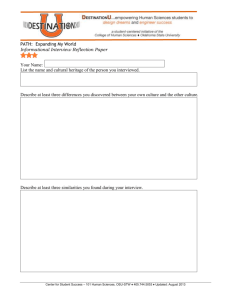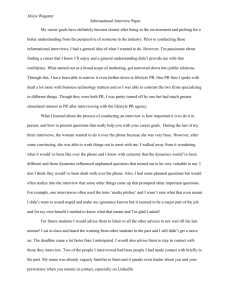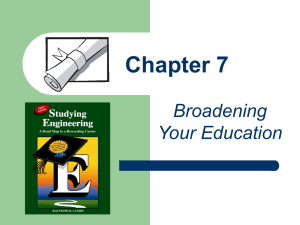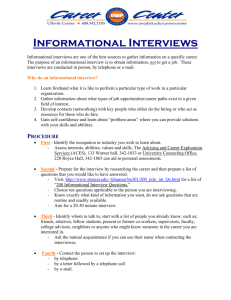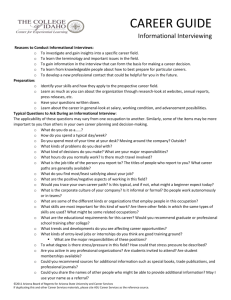Informational Interviewing Guide
advertisement
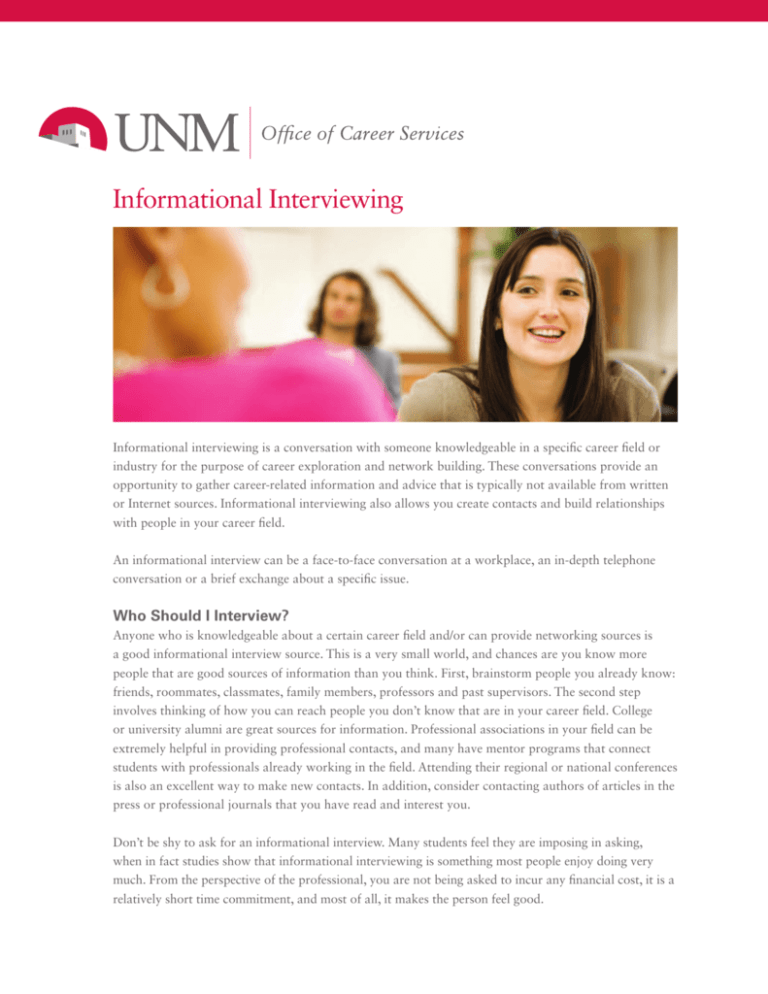
Informational Interviewing Informational interviewing is a conversation with someone knowledgeable in a specific career field or industry for the purpose of career exploration and network building. These conversations provide an opportunity to gather career-related information and advice that is typically not available from written or Internet sources. Informational interviewing also allows you create contacts and build relationships with people in your career field. An informational interview can be a face-to-face conversation at a workplace, an in-depth telephone conversation or a brief exchange about a specific issue. Who Should I Interview? Anyone who is knowledgeable about a certain career field and/or can provide networking sources is a good informational interview source. This is a very small world, and chances are you know more people that are good sources of information than you think. First, brainstorm people you already know: friends, roommates, classmates, family members, professors and past supervisors. The second step involves thinking of how you can reach people you don’t know that are in your career field. College or university alumni are great sources for information. Professional associations in your field can be extremely helpful in providing professional contacts, and many have mentor programs that connect students with professionals already working in the field. Attending their regional or national conferences is also an excellent way to make new contacts. In addition, consider contacting authors of articles in the press or professional journals that you have read and interest you. Don’t be shy to ask for an informational interview. Many students feel they are imposing in asking, when in fact studies show that informational interviewing is something most people enjoy doing very much. From the perspective of the professional, you are not being asked to incur any financial cost, it is a relatively short time commitment, and most of all, it makes the person feel good. Getting Started: How to Prepare for an Informational Interview Do Initial Research You should conduct some initial research on the career field and/or industry before an informational interview. Remember, an informational interview is done to get information you can’t find in career literature, trade publications, company information or on the Internet. Therefore, ask questions that go beyond the obvious. Also, try to find out as much as possible about the professional and his or her organization, as you want to appear knowledgeable, informed and interested. Develop Interview Questions Through your initial research, you will develop questions you would like answered in the interview. Think about what you hope to learn and the kinds of questions that will elicit that information. Most people prefer to answer questions that require them to reflect on their work. Open-ended, evaluative questions are often an effective way to start the conversation. Customize questions to fit your personality, interests, values, career goals and other criteria that are important to you. Potential areas for questions can include: • What the Job/Work is Like - The challenges, frustrations, rewards encountered; kinds of decisions required; problems solved; how time is spent on the job. • Motivation and Interest - How the professional was attracted to this career. Advice they have for students considering this occupation. • Essential Skills and Abilities - Both necessary and desirable skills, education, experience required, training or preparation. • Professional Development - Career paths and advancement. • Lifestyle Implications of the Work - Salary/benefits, travel, pressure, flexibility, security. • Work Environment - Physical setting, people (colleagues and clients), organizational structure and culture. • Current Issues in the Industry – Personal perspective that goes beyond what you have read. • Ways to Get More Information - Professional journals, professional organizations, other contacts or networking sources. Potential Questions If you are having difficulties generating specific questions, here is a list to get you started (adapted from the National Career Development Association’s Facilitating Career Development Student Manual – 2nd edition): • How did you get into this field? • What is typical day like for you? • What has your career path been like? • Where might you go from here? • What professional organizations do you belong to? • Is professional development an important part of your career? • What training can I expect in this field? • What trends do you see influencing the profession? • What is the biggest problem facing the profession today? • What are the best sources for learning more about the industry? • What is the preferred way to network within this field? • What next steps might you suggest for me? • Is there anyone else you know that I should be talking to? • May I let them know you referred me? • What are the most effective techniques for getting a job in this field? Asking for an Informational Interview Write, Call or Email A student can either write, call, email or a combination of all three. The initial contact method should be in the preference the referral source has indicated. If there was no preference given, choose the method you feel most comfortable with. Important Factors to Remember When Contacting a Perspective Informational Interviewer • Be clear and direct about the goal of the interview. Remember, you are requesting information, not a job. • Always cite the person(s) who provided you with the contact source. “Joe Smith suggested I contact you as a source of information in the field of biology.” • Stress that you will meet him or her at their convenience. However, be prepared to settle for a phone interview on the spot. • Indicate how much time you will require. Most interviews will last 30-60 minutes. Informational Interviewing Etiquette Confirm the Interview: Call or email to confirm the interview about 48 hours prior. Dress Appropriately: While this is not a formal job interview, appearances matter. Wear appropriate professional/business attire. Arrive Early: Arrive about 15 minutes prior to your interview. As with any professional meeting, never be late. Act Professionally: You want to showcase your professional attitude and composure to make a good impression. Remember, informational interview contacts are networking contacts. Be Prepared: Come prepared with well-researched questions. Don’t expect the person being interviewed to drive the meeting. Be prepared to respond to questions from the professional such as, “What can I do for you?,” or, “What can you tell me about yourself?” Jot Down any Special Points: Clarify any terms you don’t know or anything you don’t understand, and keep track of any referrals or suggestions. Finish writing down what you have learned immediately after the interview. Stay Within Your Time Limit: Unless the professional indicates otherwise, never go beyond the amount of time requested. Be sensitive to nonverbal clues that it is time to end the interview. Know How and When to Present Your Resume: You should always bring copies of your resume to an informational interview. Make sure that you treat it as an effective way to give your contact a sense of your background, or as something you seek advice on, rather than a ploy to get a job. Send a Thank You Note: After an interview, always send a thank you note. Frequently Asked Questions How many informational interviews are enough to get a good representation of my career field? The more people you speak to, the better. This doesn’t mean you have to do 200 interviews, but speak to more than one or two people. Don’t let one interview sway you. Seek to gain multiple perspectives so that you can gain an accurate picture of the profession. The earlier in your student career you start doing informational interviews, the more people you can speak with and start establishing professional relationships. I requested an informational interview and the person suggested we speak over lunch. Who pays? Most professionals remember what it was like to be a student on a tight budget. If a professional suggests meeting during lunch or dinner, chances are he or she will offer to pick up the tab. However, the general rule is he or she who invites pays, which is you. Be prepared to pay for both meals or at least your own. I did an informational interview with an alumni and he was not able to help me as much as I had thought. Do I still need to send a thank you letter since I will not be contacting him further? Yes a thank you note is just common courtesy. Even if the professional is not in a position to help you now, you never know when you might run into him or her again and in what situation.
